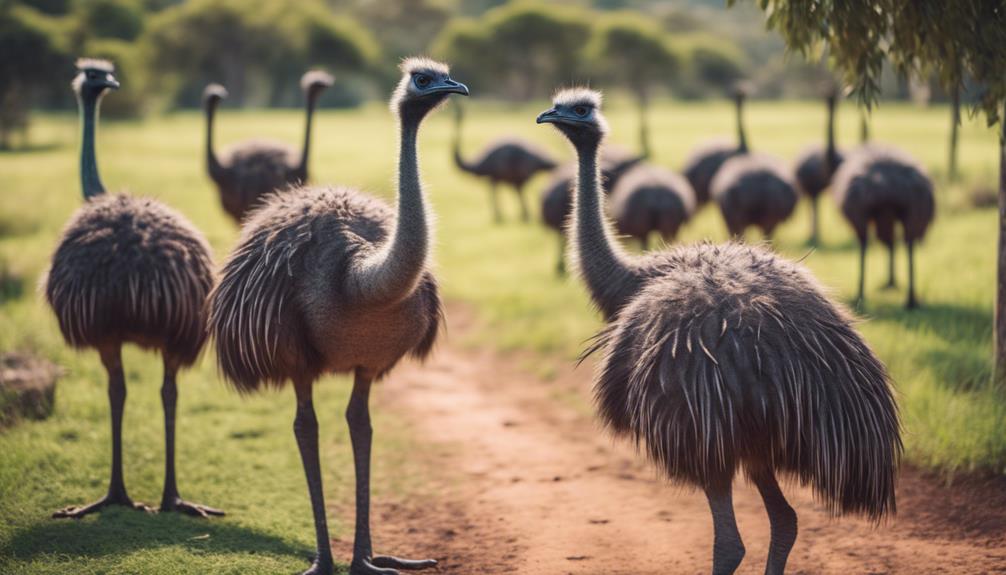
In the realm of emu farming, navigating ethical considerations is paramount to ensuring the welfare of these unique creatures. As you delve into the intricate balance between sustainable practices, animal welfare, and environmental impact, a myriad of questions and challenges arise. How can farmers strike a harmonious equilibrium between profit and compassion? What role does consumer awareness play in shaping the industry? By exploring these ethical dilemmas, a deeper understanding of the interconnectedness of farming, ethics, and consumer choices emerges.
Key Takeaways
- Provide proper shelter and space for emus to roam freely.
- Ensure nutritional needs are met for healthy emus.
- Conduct regular health checks to monitor emus' well-being.
- Uphold high animal welfare standards in all aspects of farming.
- Implement sustainable practices to mitigate environmental impact.
Ethical Treatment of Emus
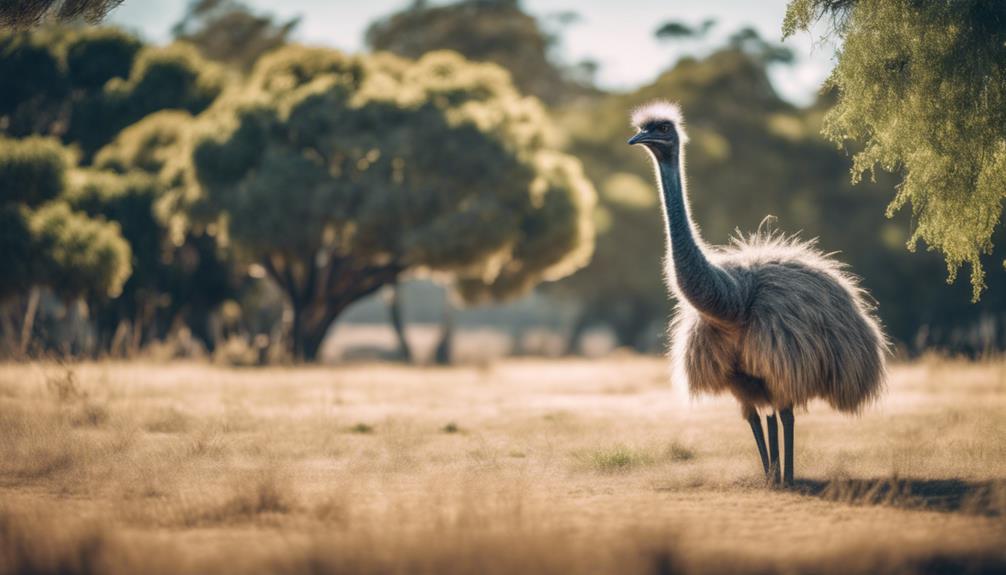
When raising emus on a farm, it's crucial to ensure their ethical treatment is prioritized at all times. Emus are majestic creatures that deserve respect and care in every aspect of their lives. Providing them with proper shelter, ample space to roam, and a diet that meets their nutritional needs is fundamental. Emus thrive in environments where they can exhibit their natural behaviors, so it's essential to create a setting that allows them to express themselves freely.
Ensuring the welfare of emus also includes regular health checks by qualified professionals to detect any signs of illness promptly. Emus are hardy animals, but they can still fall victim to various health issues that need to be addressed promptly. Additionally, handling emus with care and gentleness is crucial to building trust and minimizing stress for these sensitive creatures.
Animal Welfare Standards
To ensure the well-being of emus on a farm, it's essential to uphold high animal welfare standards. Emus, as sentient beings, require proper care and attention to thrive in a farming environment. Providing adequate shelter, access to clean water, and a balanced diet are fundamental aspects of ensuring their welfare. Regular health checks by qualified professionals help in early detection and treatment of any health issues, safeguarding the emus' well-being. Additionally, creating an environment that allows for natural behaviors, such as dust bathing and foraging, promotes their mental and physical health.
Implementing protocols for humane handling and transportation is crucial in minimizing stress and discomfort for the emus. Training farm staff in proper animal handling techniques contributes to a safe and respectful environment for the emus. Regular monitoring of the farm practices and continuous improvement in line with the latest welfare research are vital to upholding high standards of animal welfare. By prioritizing the welfare of emus, you demonstrate a commitment to ethical farming practices and ensure the prosperity of both the animals and the farm.
Sustainable Farming Practices
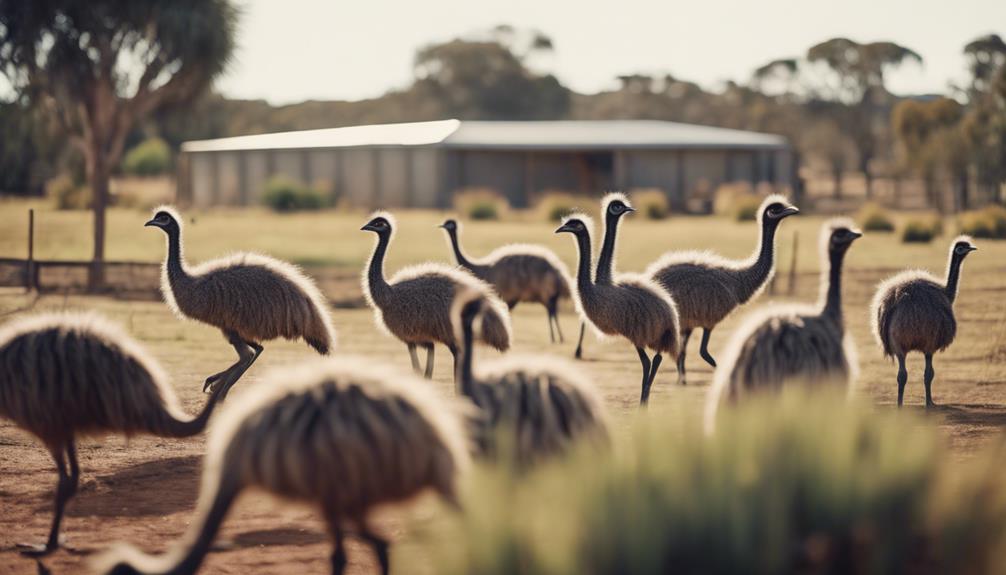
Embrace sustainable farming practices to ensure the long-term health of your emu farm and the surrounding environment. By implementing environmentally friendly techniques, you can create a thriving and resilient farm that benefits both your business and the ecosystem. Here are some key sustainable practices you can integrate into your emu farming operation:
| Sustainable Farming Practices | Description | Benefits |
|---|---|---|
| Rotational Grazing | Rotate emus to different pastures | Preserves pasture health |
| Rainwater Harvesting | Collect rainwater for farm use | Reduces water consumption costs |
| Organic Feed | Provide emus with organic feed | Enhances emu health and well-being |
These practices not only support the health and well-being of your emus but also contribute to the conservation of resources and the overall sustainability of your farm. By incorporating these methods, you are demonstrating your commitment to responsible and ethical farming practices, ensuring a prosperous future for your emu farm.
Environmental Impact Mitigation
Taking steps to mitigate the environmental impact of your emu farming operation is crucial for ensuring the sustainability and longevity of your farm. By implementing environmentally friendly practices, you can minimize the negative effects of emu farming on the surrounding ecosystem. One significant way to achieve this is by managing waste efficiently. Proper disposal of emu waste, such as manure, can prevent water contamination and soil degradation. Composting the waste can also turn it into a valuable resource for fertilizing your crops, creating a closed-loop system that benefits both your farm and the environment.
Furthermore, controlling water usage is essential in reducing your farm's environmental footprint. Implementing water-saving technologies like drip irrigation systems can help conserve water resources and prevent unnecessary wastage. Additionally, planting trees and native vegetation around your farm can provide habitat for wildlife, prevent soil erosion, and enhance biodiversity.
Emu Breeding Ethics

Implementing ethical breeding practices is essential for ensuring the well-being of emus in your farm operation.
When breeding emus, it's crucial to prioritize their health and welfare above all else. Select breeding pairs carefully, considering genetic diversity and avoiding inbreeding to maintain strong and healthy offspring.
Regular veterinary check-ups for breeding emus can help detect any potential health issues early on, ensuring the well-being of both the breeding birds and their offspring. Monitoring breeding conditions, such as temperature and lighting, can also contribute to successful breeding outcomes.
Additionally, providing ample space for emus to engage in natural behaviors like nesting and mating is vital for their physical and psychological health. By upholding high ethical standards in emu breeding, you not only promote the welfare of your birds but also establish a reputation as a responsible and caring emu farmer within the industry.
Emu Farming Regulations
Adhering to comprehensive emu farming regulations is crucial for ensuring the welfare of your emus and maintaining a sustainable operation. These regulations cover various aspects such as housing requirements, transportation standards, and healthcare protocols for your emus. By following these guidelines diligently, you not only protect the well-being of your emus but also contribute to the overall success and reputation of your farm.
Understanding and complying with these regulations demonstrate your commitment to responsible and ethical emu farming practices. It showcases your dedication to upholding the highest standards in animal welfare and environmental stewardship. By staying informed about the latest updates and changes in regulations, you position yourself as a leader in the industry.
Humane Slaughter Methods
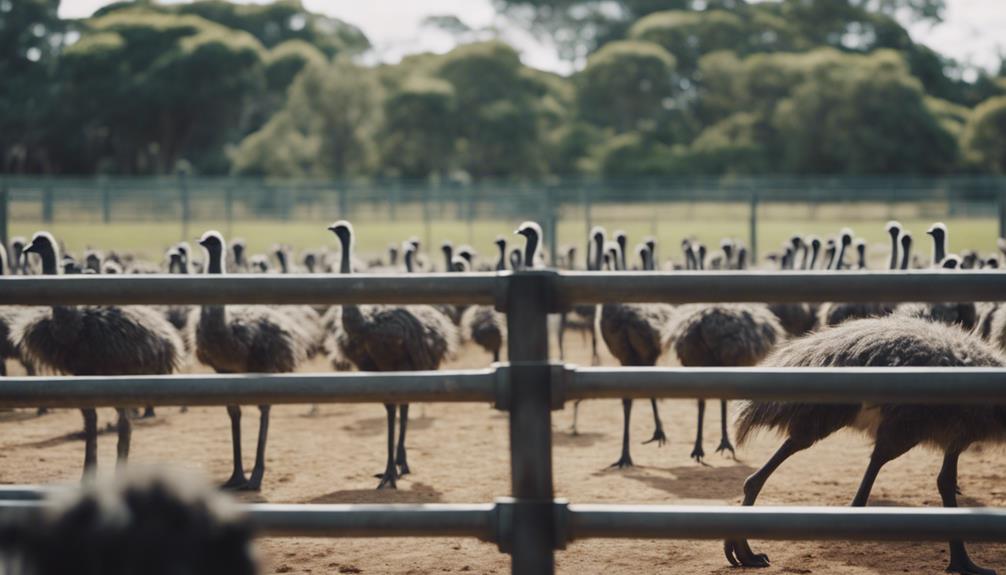
To ensure the ethical and humane treatment of your emus, it's essential to carefully consider appropriate slaughter methods. When the time comes to slaughter your emus, prioritizing their well-being should be at the forefront of your decision-making. Utilizing methods that minimize stress and pain is crucial for upholding ethical standards on your farm.
One humane slaughter method that you may consider is electrical stunning followed by swift slaughter. This method ensures a quick and painless death for the emus. Proper training for those involved in the slaughter process is essential to guarantee that it's carried out effectively and compassionately.
Additionally, using a well-maintained and sharp knife for slaughtering is vital to ensure a swift and efficient process. Dull knives can cause unnecessary suffering for the emus, which goes against the principles of humane treatment.
Emu Habitat Preservation
Preserving the natural habitat of emus is essential for ensuring their well-being and survival in the wild. Emus thrive in specific environments that cater to their unique needs, and as stewards of the land, it's crucial to protect these habitats.
To achieve this, consider the following:
- Preserve Biodiversity: Emu habitats are rich in biodiversity, which is essential for their food sources and overall ecosystem balance.
- Maintain Ecosystem Health: By safeguarding emu habitats, you contribute to the well-being of various species that rely on these ecosystems for survival.
- Prevent Habitat Destruction: Avoid activities such as deforestation and overgrazing that can harm emu habitats and disrupt their natural way of life.
- Support Conservation Efforts: Get involved in initiatives aimed at conserving emu habitats, ensuring a sustainable future for these majestic birds.
Consumer Awareness and Education
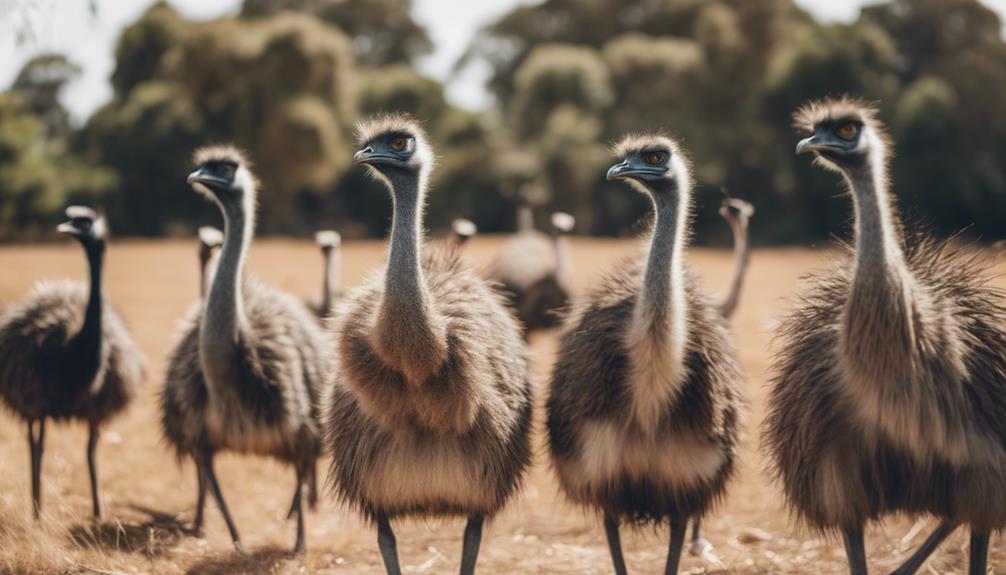
Enhancing consumer awareness and education plays a crucial role in promoting ethical practices within the emu farming industry. As a consumer, being informed empowers you to make choices aligned with your values and beliefs. By understanding the impact of your decisions on the welfare of emus, you hold the power to drive positive change in the industry.
To assist you in making informed decisions, here is a table outlining key factors to consider when purchasing emu products:
| Factor | Description | Importance |
|---|---|---|
| Farming Practices | How are the emus raised and cared for? | High |
| Product Labeling | Are the products labeled accurately? | Medium |
| Sustainability | Is the farm environmentally conscious? | High |
| Animal Welfare | Are the emus treated humanely? | High |
| Certification Programs | Does the farm adhere to ethical standards? | Medium |
Ethical Marketing Strategies
When considering ethical marketing strategies in emu farming, it's imperative to prioritize transparency and consumer trust. Emu farmers should strive to uphold ethical standards in their marketing practices to build strong relationships with consumers. Here are some key strategies to consider:
- Honesty: Communicate openly about farming practices, animal welfare, and product quality to establish trust with consumers.
- Clear Labeling: Ensure that product labels provide accurate information about the origin of the emu products and the methods used in their production.
- Environmental Sustainability: Highlight sustainable farming practices that minimize environmental impact and promote biodiversity.
- Community Engagement: Engage with local communities to showcase the positive impact of emu farming on the economy and environment.
Emu Product Labeling Standards
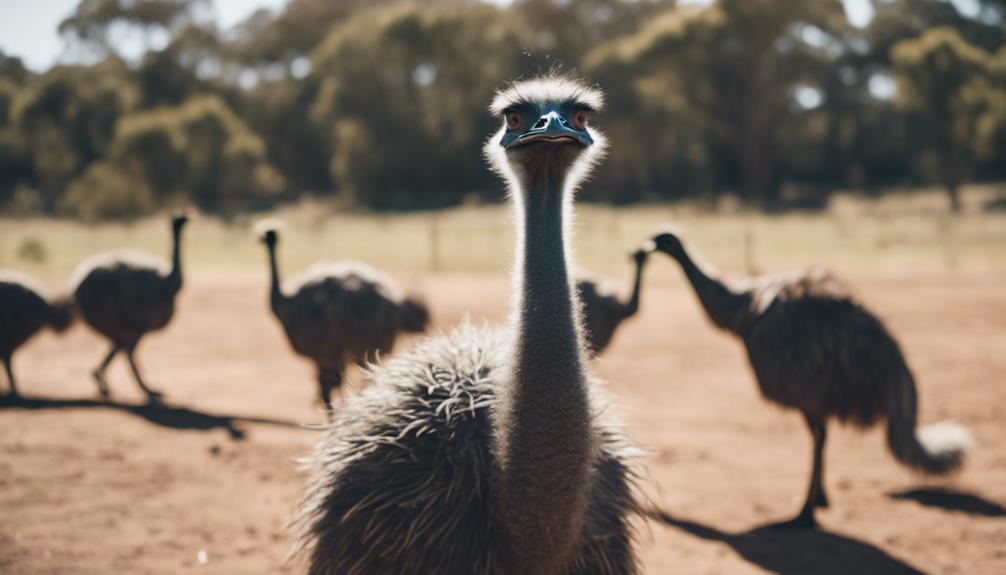
To ensure transparency and consumer confidence in emu farming practices, adherence to clear and accurate product labeling standards is essential. When purchasing emu products, you deserve to know exactly what you're getting. Product labeling should include information on the origin of the emus, the farming practices employed, and any certifications obtained, such as organic or humane labels. This transparency empowers you to make informed decisions aligned with your values.
Look for labels that provide details on how the emus were raised, fed, and cared for, so you can support ethical and sustainable practices in the industry. Clear and accurate labeling not only benefits you as a consumer but also promotes accountability within the emu farming sector. By demanding comprehensive product information, you contribute to a system where honesty and integrity are paramount.
Embrace your power as a consumer by choosing products that uphold high labeling standards, reflecting the values you hold dear.
Industry Transparency Initiatives
For a deeper understanding of the emu farming industry, exploring the various industry transparency initiatives can shed light on the practices and efforts being made to uphold ethical standards. When considering the transparency initiatives within the emu farming sector, you can gain valuable insights into the commitment of the industry to ethical practices. Here are some key initiatives to be aware of:
- Farm Visits: Some emu farms offer guided tours to the public, allowing visitors to witness firsthand the living conditions of the emus and the farming practices in place.
- Online Webcams: Certain farms have installed webcams in their facilities, providing real-time footage of the emus' daily lives and the farming operations.
- Annual Reports: Many reputable emu farms publish detailed annual reports outlining their sustainability practices, animal welfare standards, and any improvements made throughout the year.
- Certifications: Look for emu farms that hold certifications from recognized organizations that attest to their adherence to ethical standards in farming practices.
Frequently Asked Questions
Can Emus Be Raised Alongside Other Livestock on the Farm?
Yes, you can raise emus alongside other livestock on the farm. Emus are hardy birds that can coexist with various animals. Ensure proper fencing and separate living spaces to prevent any potential conflicts or stress.
Do Emus Require Specialized Veterinary Care Compared to Other Animals?
Emus do require specialized veterinary care due to their unique needs. Regular check-ups and monitoring are essential for their health. Emu farmers should work closely with vets knowledgeable in emu care to ensure their well-being.
How Do Emu Farms Contribute to Local Economies and Communities?
In the heart of local economies, emu farms provide jobs, support small businesses and foster community growth. The unique products and services offered create opportunities for sustainable development and prosperity, enriching lives.
Are There Any Specific Challenges in Transporting Emus for Processing?
Transporting emus for processing can be challenging due to their size and specific needs. Ensuring proper handling and comfortable conditions is crucial. Be mindful of stress levels and maintain a calm environment to minimize any potential issues.
What Are the Potential Risks of Introducing Emus to New Habitats for Conservation Purposes?
What potential risks are involved in introducing emus to new habitats for conservation? Ensuring genetic diversity, preventing disease transmission, and avoiding habitat disruption are critical. Management plans, monitoring, and community involvement can mitigate these risks effectively.
Conclusion
As you reflect on the ethical considerations in emu farming, remember the importance of treating these majestic birds with care and respect.
Consider how your choices as a consumer can impact the well-being of emus and the environment. Do you want to support farms that prioritize animal welfare and sustainability?
By staying informed and making conscious decisions, you can play a role in promoting a more ethical and responsible emu farming industry.




